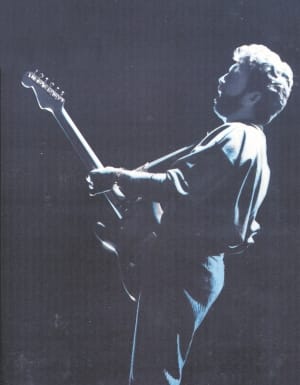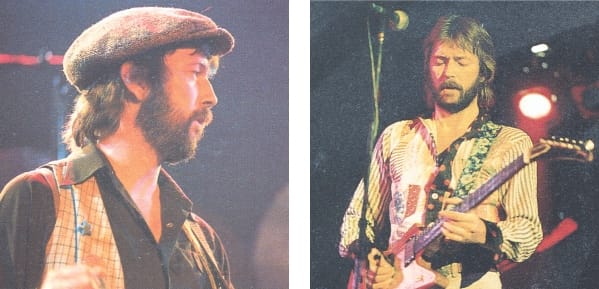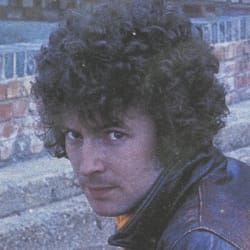| Home - Back Issues - The Team - Contact Us |
 |
| Volume 11 |Issue 13| March 30, 2012 | |
|
|
Tribute Livin' on Blues' Power the Star pays tribute to Eric Clapton, the legendary blues guitarist who turns 67 today. Having spent close to 40 years in the music industry, Clapton remains one of the most influential musicians in the world. Naimul Karim From receiving critical acclaim and multi-platinum sales to getting inducted in the Rock and Roll hall of fame thrice, Eric Clapton has probably accomplished every dream that a mortal-musician is perhaps capable of achieving. Be it the ‘women's tone’ of his Gibson or the reckless bends in his solos, Clapton's guitar-play has managed to earn a place in almost every guitarist's heart. With such a wide array of musical armour, it wouldn't be fair to 'Slowhand' or to his fans if one were to make an attempt to write about the so-called 'positive elements' of his music.
Despite an extensive contribution in the field of music, Clapton, in various interviews, has often said that he always wants to be remembered as a blues guitar player; a mere glance through the events of his life tells us why. Born on March 30 1945, Clapton grew up believing that his maternal grandparents were his real parents and that his mother was actually his older sister. His father was a Canadian Soldier who left before his birth. The blues fit perfectly with his life's perception of being different as compared to the other kids in town. A musician at heart, it compelled him to look beneath the surface and explore the roots of rock in American Blues. With influences of guitarists such as BB King, Buddy Guy, Robert Johnson, Clapton himself managed to adapt a unique style of guitar-play with a tone that made him one of the most sought-after artists in the British Music Industry. One of his major strengths has been his ability to create covers of songs and take them to a different level all together. Be it JJ Cale's 'Cocaine' or Muddy Water's 'Hoochie Coochie Man' , his distinctive guitar solos and his constant fascination to mesh the blues with the orchestra and other forms of music, have been critically acclaimed and has provided a whole new dimension to these songs. The MTV Unplugged concert which took place in 1992 and the album ' From the Cradle' released in 1994 are prime examples which prove how much of a perfectionist Clapton was during his peak years. The concert saw Clapton use five different guitars in order to provide the best possible output. While other Rock & Roll artists would just replace their electric guitars with acoustics, Clapton was extremely specific with his choice of guitars and wanted the songs to sound perfect. He only played songs that suited the acoustic environment, like old Robert Johnson tunes, or he rearranged them into something completely new, like the acoustic version of ‘Layla.’ As Alex Coletti, producer of the MTV concert, in an interview stated, "Clapton used the show to teach his listeners a lesson in music history, not only introducing a generation of MTV viewers to a world of country blues songs, but also demonstrating that a man with an acoustic guitar can seriously rock out."
'From The Cradle', an album that contains the cover versions of a series of 12-bar blues songs, went on to become the best selling album worldwide in 1994. It was a tribute to his guitar heroes who he had studied in a very detailed manner. The songs were recorded live in the studio just so that they could get the right sound. Andy Fairweather Low, who played along with Clapton in the album, in an interview in 2008 said "What was unusual was that everything was recorded live in the studio, so Eric could capture that live feel. We'd get in at 10 in the morning and by the evening, we'd pack up to go home and we'd realise we'd only played one number all day. We'd do it over and over again, in search of that elusive take where the vocals were right." It was one of those albums where Clapton tried his best to stick the original versions of the songs and yet provide his signature touch, in terms of guitar solos. Songs such as Eddie Boyd's 'Five Long Years' or Sonny Thompson's ' I'm Tore Down' were in a sense re-arranged the 'Clapton' way.
Clapton's precision in the album in terms of sound was best described by Lee Dickson, his guitar technician, in an interview," Oh, we had just tons and tons of guitars there, and twenty four guitars on the road for the tour, just because of the selection of music he was playing. He was copying everyone's style – doing an Elmore James slide thing, a B.B. thing, Robert Johnson… we had a guitar change on almost every other song, and that was the nature of the beast." From the initial stages with the Yardbirds and the Bluesbreakers to forming one of the earliest super groups, Cream, in the 60s and then moving on to Derek and the Dominos in the 70s, following which he went solo, Clapton always managed to provide a unique stance to music, throughout his career. Apart from mesmerising the world with his guitar licks, Clapton also organises concert to support a rehab centre which he started in Antigua. The concert entitled 'Crossroads' raises funds for the centre and is also one of the rare occasions that witnesses legendary guitarists such as BB King, Robert Cray and Buddy Guy come together and play the blues like they used to. As Clapton turns 67, one can't help but wonder about the series of changes that he introduced in the field of music. From enthralling listeners with songs related to his life, such as Layla and Tears in Heaven, to providing a new meaning to the genre of Blues, Eric Patrick Clapton has and will continue to be an icon for musicians all over the world. Copyright
(R) thedailystar.net 2012 |


